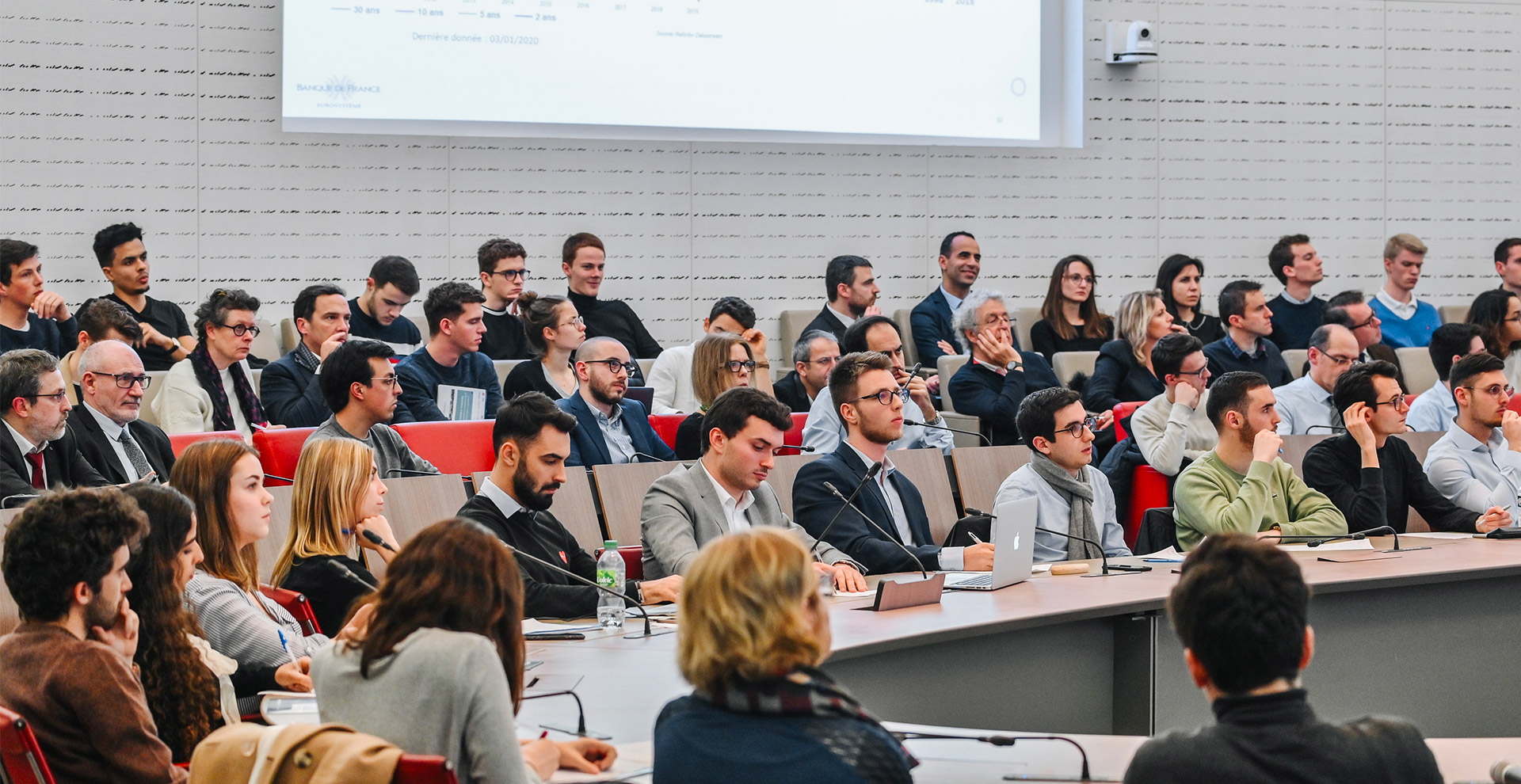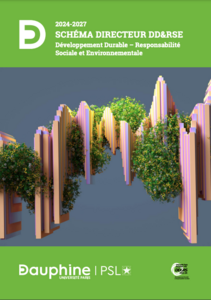University Environmental and Social Responsability at the heart of the university’s strategic plan
SD & SER Master Plan
Université Paris Dauphine - PSL has established its commitment to environmental and social responsibility through a strategic action plan. This commitment is formalized in the Sustainable Development and Social and Environmental Responsibility Master Plan with the aims of stepping up its commitment and mobilizing the entire community, including teachers, researchers, administrative staff, students and alumni, to deal with issues surrounding the environmental and social transition. As such it represents a major steering tool for our institution’s policy in these areas.
The Dauphine Durable program
The Dauphine Durable program confirms this commitment, with the aims of better disseminating the principles of sustainable development and social responsibility among students, developing scientific productions on these issues and improving the university’s operation in terms of its environmental impact and quality of life for its students and staff.
In June 2016 the university signed up to the Global Compact France and signed the Principles for Responsible Management Education charter.
The Dauphine Foundation
Fondation Dauphine supports the university’s development in terms of social responsibility with support for the institution’s Equal Opportunity policy and research through the financing of chairs, research initiatives, or via the Madeleine Foundation.
Governance
Governance devoted to the University Environmental and Social Responsability underscores the desire to make it one of the mainstays of the policy driven by the university. It features stronger management of UESR facilitated by a Vice President. The VP facilitates the university's RSU policy and raises this issue within COMEX and with stakeholders.
The Vice President in charge of University Environmental and Social Responsibility is supported by an adviser, 5 representatives and a project manager :
- An « Environmental and Social Responsibility » adviser assesses the environmental impact of activities undertaken by Dauphine and proposes mechanisms to allow the university's practices to improve.
- An « Equality and Anti-discrimination » representative handles matters related to equality, the fight against all forms of discrimination, and the promotion of gender equality and diversity, particularly social and geographic diversity.
- Two LGBT+ advisers ensure application of the action plan to oversee the university’s commitment to creating an inclusive environment, to providing visibility and training on LGBTQ+ issues and to combating anti-LGBTQ+ sentiment.
- A « Scientific Integrity » representative formulates a policy on scientific integrity, implements a procedure for investigating and processing cases of breached scientific integrity, and brings attention to the issues of ethics training, professional standards, and integrity.
- A project manager steers and coordinates the implementation of all RSU actions.
Finally, bodies set up at the university constitute forums for discussion, work and relays for disseminating information and putting projects into practice.
This council is a collegial space for debate, reflection and proposals on the major transitional issues to which our university’s responsibility is committed.
It comprises some forty members, including elected representatives of teachers, researchers, administrative staff and students, who are also members of central and department councils; staff representatives; PhD student representatives; student organization representatives, as well as qualified bodies outside the university appointed for their expertise and their willingness to engage in these topics.
Its activity thus far has involved the adoption of 4 proclamations currently in place:
Established in 2018 and composed of about 30 people belonging to the various departments and research labs at the university, this network facilitates the concrete application of RSU principles by ensuring that information is shared and disseminated.
With meetings every quarter, these correspondents help to promote good practices and bring about new projects and proposals, especially those related to the university's operations and environmental issues.
Active participation of students, elected officials and associations
Students and their associations are fully involved in transition-related issues within the university. They act within the context of the Environmental and Social Council, taking part in plenary session discussions and within workshops or by presenting their own work (on disability issues, border risks and social responsibility of the university).
Annual student citizen agreement
Starting in fall 2024, this agreement will achieve three aims:
Organizational : by encouraging students’ commitment to building their university and to formulating clarified proposals for improvement
Democratic : by offering students an experience of democratic reflection equipped with expertise and a different way of taking action to promote the ecological transition
Pedagogical : by strengthening training around these issues with a specific pedagogy
12 charitable organizations
There are many so-called philanthropic organizations at Dauphine, with 12 organizations and close to 600 students involved
By way of illustration see the following:
Philanthropic initiatives organized on campus (clothing collections, runs to raise money for cancer) or off campus (supporting people living on the street), awareness-raising related to disabilities (stuttering oratory competition)
Initiatives in favor of equality (Pépite Sexiste association wall) and against sexual and gender-based violence (participation in back-to-school day for students in the 1st year of the Bachelor's Degree)
Lectures, debates, film screenings, etc.
These organizations are also widely involved in institutional events related to these issues, such as Disability Week, Equality and Diversity Week, Dauphine Durable meetings and the publicity campaign on sexual and gender-based violence…
With support from various organizations, Dauphine students distinguish themselves throughmany philanthropic and activist commitments at the local, national, and international level.
Cheer Up
For over 10 years, the student organization Cheer Up has sought to help young people with cancer to fight the illness.
Dau'Amnesty
Dau'Amnesty International is the youth branch of Amnesty International at Dauphine.
Dauphine Durable (Daudu)
Daudu organizes conferences, workshops, and a Green Week, and leads a number of dynamic projects every year.
Dauphine Microfinance (DMF)
DMF implements actions so that an individual's financial resources does not stop them from creating or expanding a business, which they do by promoting access to credit.
Dauphine NUM
The purpose of this organization is to train students from the university in international negotiations through the Model United Nations system.
Dauphine Solidarité Handicap
This organization works to help people with disabilities in concrete ways and organizes about 10 awareness-raising events throughout the year.
Fleur de Bitume
Fleur de Bitume is an activist organization that struggles against exclusion in all its forms.
Go to Togo
In partnership with a local NGO, Go To Togo contributes to the development of educational access in Togo through the construction of facilities, including seven schools, wells, etc.
Les Mutin.e.s
The feminist organization Les Mutin.e.s was founded to promote, educate about, and defend gender equality at Dauphine.
Les Simone
Les Simone is a pluralist coalition of people belonging to various feminist movements, which makes the organization varied.
NOISE
The Nouvel Observatoire de l’Innovation Sociale et Environnementale (NOISE) showcases innovations with a positive impact on our society and promotes their integration into education.
Unicef Dau
The Dauphine branch of UNICEF takes steps to promote education, health care, nutrition, sanitation, and hygiene, as well as innovation, in support of children.
DU Passerelle
Finally, students collaborate on the DU Passerelle - Student in exile program by helping to coordinate this training and to mentor students. About 60 students have been mobilizing around this program every year, and it would not be successful without their support.
The university believes that student engagement contributes to educational enrichment by developing civic skills that are crucially complementary to academic training. Over 1 300 students each year submit a request for recognition of their involvement and receive extra credit.
The RSU Team
ARNAUD MIAS
Vice President in charge of RSU
STÉPHANIE MONJON
Vice president for University Environmental and Social Responsibility
Françoise Forges
Integrity Adviser
BÉATRICE PARANCE
Delegate in charge of the University's Environmental and Social Responsibility (UESR)
MARIA J. ESTEBAN
Scientific integrity representatives
CHRISTINE VICENS
RSU Project Manager
Pascale Colisson
Equality and anti-discrimination representative
CATHERINE ACHIN et ALBAN JACQUEMART
LGBTQ+ Representatives



